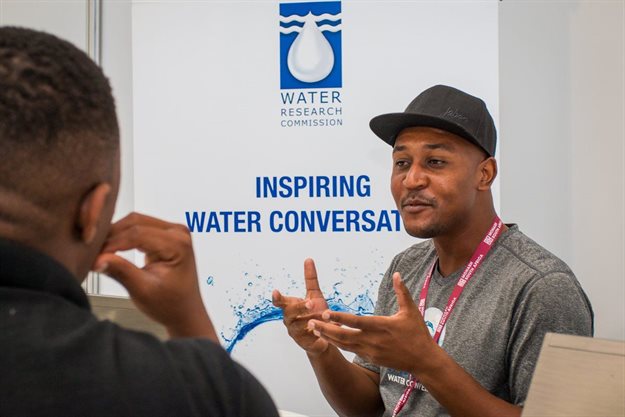Long before the coronavirus pandemic hit the South African environment, its youth population was already disproportionately affected by economic decline. A recent Quarterly Labour Force Survey conducted by Statistics South Africa placed the country's youth unemployment rate at 58.1% in the final quarter of 2019, an increase of 3.4% from the last quarter of the previous year. This shocking figure means over half of the 20.4 million South African population aged between 15 to 34 faces joblessness.

Thembela Ntlemeza, technology transfer officer, Water Research Commission
This is projected to worsen in light of Covid-19. According to the International Labour Organisation (ILO), the Covid-19 economic crisis is estimated to inflict a compounded shock on young people globally. Since the outbreak of the pandemic, more than one in six young people have lost employment, while the working hours of those who remain with jobs have been cut by 23%, says the organisation. Further to this, the ILO also reports a disruption in young people’s training and education due to the coronavirus crisis, a challenge which hinders first entrants from entering the labour market.
All is not lost
While Covid-19 disproportionately threatens to disrupt the socioeconomic well-being of young people, all is not lost for South African youth. In the wake of this challenging time, young South Africans have found ways to contribute to developing solutions for their local communities and the nation as a whole. They are doing this by mobilising their skills in a range of ways; from initiating prevention campaigns to volunteering in high risk areas to sewing masks using affordable, environmentally friendly materials. Trade and industry minister Ebrahim Patel has repeatedly expressed both encouragement and support to have products such as face masks manufactured within our country. His call has been met by massive appetite by many, mostly young entrepreneurs, who are flooding social media with their creative and colourful face mask designs.
The young cohort of the South African population is also harnessing technology and innovation to design solutions geared towards flattening the Covid-19 infection curve. For example, 32-year-old Mabopane-based Rorisang Mpete, co-founder of Loo Afrique, and colleagues have developed a range of innovative potable handwashing stations for non-reticulated settlements.
Portable handwashing stations
These include the Ubuntu Wash B1000, a mass community portable handwashing station suitable for areas with limited water access which provides multiple wash points at a time and contains a 300 litre freshwater capacity tank. In addition, the youth-owned SME has designed the Imbizo Wash B3000, a mass community portable hand wash station developed to cater for high density areas with limited access to water. The product contains multiple wash points and is accompanied by a 10,000 litre freshwater storage tank and a 10,000 litre grey water storage tank. The freshwater tank can be refilled by a municipal water line or a water truck tanker service, while the grey water is desludged by a desludging truck service or re-directed to a municipal sewerage line. Loo Afrique is a 100% black youth-owned company which is supported by the Water Research Commission (WRC) through the South African Sanitation Technology Evaluation Programme (SASTEP), an initiative funded by the Department of Science and Innovation (DSI) and the Bill and Melinda Gates Foundation (BMGF).
Young innovators face many challenges
While the pandemic has certainly brought into sharp focus the potential of innovation to curb the ongoing challenges faced by young people, young innovators still face many challenges. Young entrepreneurs who have been fortunate to enter the market are failing to increase their incomes through developing distinctive, higher value products and services. They are instead caught up in a constant struggle to survive. Many more are still struggling to access capital and credit to participate competitively in the market. Bureaucratic and costly regulatory hurdles also hamper business registration and formalisation, forcing young entrepreneurs to operate in their backyards, far away from formal points of trade where they would have access to potential clients.

Sifiso Mazibuko, communications officer, Water Research Commission
Young innovators in the township economy face even more severe challenges. The government can claim to have made a contribution to empowering the township economy, however there is still very little evidence in support of this. In 2018, we learned of the Economic Stimulus and Recovery Plan which included the reprioritisation of R50bn in government spending towards the township economy and rural areas. Whether the plan has yielded any progress for the township economy and its young participants, in particular, is a different story altogether. Surveys also show that among other challenges, small township enterprises are disproportionally burdened by onerous administrative procedures because they do not have the dedicated capacity of established companies to deal with red tape.
Full investment, commitment needed
Innovation does not happen in a vacuum, it is enabled. The devastation of Covid-19 to our broader economy is clear and will be even clearer in months to come. The conversation we should be having now is whether we are plotting opportunities for innovation and positioning young people, in particular, to lead our economic resurgence now and beyond Covid-19. The pandemic is forcing us to rethink a lot in this regard. With the right investment and right policies, young people’s contribution to our economic and social wellbeing can prove catalytic. Their ability to be innovative and competitive demands much more than simplistic plans. It demands full investment and commitment.












































